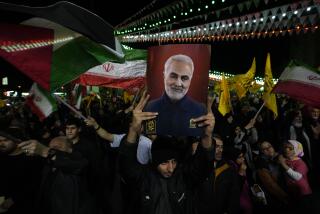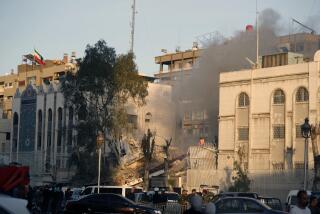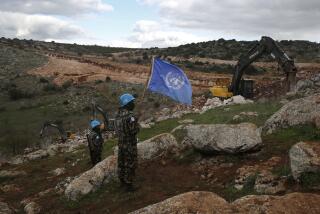U.N. approves full monitoring mission in Syria
BEIRUT — The United Nations Security Council on Saturday authorized a full monitoring mission of up to 300 observers in Syria as the advance team visited the battered central city of Homs for the first time.
Opposition activists said the bombardment of Homs, which has been shelled almost continuously for nearly three months, stopped before the monitors toured one of the hardest-hit neighborhoods, Khaldiyeh. State media reported that the team also toured the city’s devastated opposition stronghold of Baba Amr, but activists could not confirm the visit.
In addition to approving the monitoring mission, the Security Council also called for the urgent and immediate implementation of the peace plan to end 13 months of violence in Syria.
But the unrest shows no sign of ending. The cease-fire that the 300 unarmed observers will supervise has been broken repeatedly by the government of President Bashar Assad, with reports of rebel violence as well.
A week ago, the Security Council approved an advance team of up to 30 monitors, but only seven have arrived in Syria. On their visit to Homs on Saturday, online videos showed the monitors surrounded by residents and touring crumbled buildings.
The monitors were scheduled to travel to Homs’ old city, which in recent weeks has been a shelling target, but never made it. Abu Jabir, an activist in the old city, said he wasn’t sure why the team didn’t visit the neighborhood but that it might have been an issue of time.
Another Homs activist, Abu Fares, said opposition activists offered homes to stay in so the monitors wouldn’t have to return to the capital, Damascus, each night. The government, he charged, wants the monitors to visit the areas quickly so it can resume its operations.
“We want the monitors to always remain in Homs,” Abu Fares said. “If they come passing through like tourists, then the regime will continue their massacres once they leave. This will not help.”
The full U.N. mission was authorized for an initial 90-day period, but there was the question of when the observers would be deployed given the continuing violence. On Wednesday, the monitors came under fire along with protesters as they visited a suburb of Damascus.
The resolution authorizesU.N. Secretary-General Ban Ki-moonto deploy the additional monitors based on the situation, “including the consolidation of the cessation of violence.”
“The secretary-general calls upon the government of Syria and other parties swiftly to create the conditions necessary for the deployment of the mission,” Ban spokesman Martin Nesirky said in a statement. “He stresses the need for the government of Syria to end all violence and human rights violations, and in particular to stop the use of heavy weapons and to withdraw such weapons and armed units from population centers.”
But one important issue that has yet to be resolved is air transportation for the monitors. Given their small number and the size of the country, helicopters and planes are needed for them to move around quickly. But no agreement has been reached over who will provide the transportation, the Syrian government or the United Nations.
More to Read
Start your day right
Sign up for Essential California for news, features and recommendations from the L.A. Times and beyond in your inbox six days a week.
You may occasionally receive promotional content from the Los Angeles Times.






